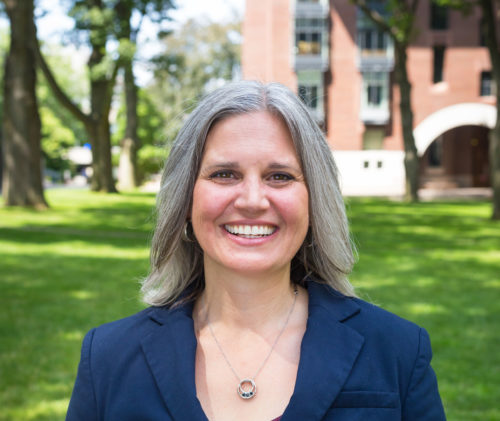ALUMNA PROFILE:
Alexia Bertrand LLM ‘05
Advisor to the Minister of Foreign Affairs, Foreign Trade and European Affairs and Deputy-Prime Minister of Belgium
I had no clue what a negotiation class actually implied before studying at Harvard Law School. Aside from one or two MBA programs, no university in Belgium offered a negotiation class at the time I pursued my law degree. I was a business lawyer when I arrived at HLS, dedicated to negotiating acquisitions, financing agreements, and other corporate documents. How could I not sign up for the “Negotiation Workshop”?
The workshop proved to be an amazing experience. On the one hand, it put words and concepts on behaviors I had naturally been adopting—setting a process at the outset, naming the game when confronted with hard bargaining tactics, asserting my interests. On the other hand it provided me with a framework to analyze my negotiations and a whole new toolbox from which to draw. Brainstorming with my counter-parties, changing the players when at an impasse, and applying value creation where possible are only a few examples of the skills I learned at HLS and still use today.
After the workshop I took “Negotiation Advanced: Deals” with Professor Guhan Subramanian. This course illustrated negotiation concepts applied to the business world. After graduation, I returned twice as a teaching assistant for the “Negotiation Workshop,” first with Linda Netsch, then with Professor Robert Mnookin. These remain among the most rewarding professional experiences I’ve had.
After practicing for eight years as a business lawyer in an international law firm, I decided to give my career a new spin by taking up a job as Advisor to the Belgian Minister of Foreign Affairs and Deputy-Prime Minister, Didier Reynders. I am responsible for all matters related to justice, asylum, and migration, as well as a few economic matters.
Belgium is a rather intricate country when it comes to its political structure. Its unique federal system must support components that reflect both various linguistic communities (French, Dutch, German) and various economic regions (Flanders, Wallonia, Brussels). These, combined with Belgium’s proportional representation voting system, keep our politicians in continuous negotiation. Our federal government counts six different parties—three representing the Dutch-speaking Belgians and three representing the French-speaking Belgians—and therefore six Deputy-Prime Ministers, who, along with the Prime Minister, are responsible for the most delicate decisions within our government.
As an Advisor to Deputy-Prime Minister Reynders, I negotiate with the six other ministers’ Advisors on each draft bill that is proposed by the government in the areas of justice, asylum, migration, or economic affairs to ensure it is in line with the values of the liberal party. One of the main challenges of the role is to find a value-creating agreement within the mandate received. Liberals, socialists and Christian-democrats, Flemish- and French-speaking representatives all have to come to an agreement they can sell to their constituents. Thus I think the Belgians have an embedded culture of negotiation. The result is often unexpected, complex, multilayered and may involve a renegotiation a few years later. This is what we refer to as a “Belgian compromise.” The Belgians’ negotiation skills prove particularly useful in the European context and put us at the forefront of many complex European negotiations.
Recently I and the other Advisors were involved in a discussion on the position Belgium was to adopt in an EU-level negotiation with a non-member state. A few EU countries had taken a stricter view on a particular issue and wanted to express this in a non-paper (an off-the-record or unofficial presentation of policy) to the Commission. As we discussed whether Belgium should add its signature to the non-paper, most government parties expressed willingness. However, one party did not want to associate Belgium with the member states on the non-paper because these same member states had, in their view, taken a disturbing position towards the non-member state on another, unrelated topic. They feared Belgium could be perceived as agreeing with their position on that other topic if it signed the non-paper. As the debate became more animated, a few advisors suggested simply deferring the question to the Ministers. Believing us capable of finding a solution within our group, I initiated a brainstorming session. The group eventually came up with a value-creating solution—to write its own non-paper that would literally be a copy-paste of that of the other member states. This met all parties’ interests of sticking to our message on the substance while avoiding any amalgamation on our position on the unrelated topic.
This example points to the myriad ways my HLS negotiation training is invaluable in my everyday life. It also fundamentally changed the way I interpret certain behaviors. I can now accept what I would previously have labeled “bad faith” as simply a different perception of reality by my counter-parties, an approach invaluable in the political life.
Alexia Bertrand is an Advisor to the Minister of Foreign Affairs and Deputy-Prime Minister of Belgium, Didier Reynders, in matters related to justice, asylum, and migration. She also serves on the Counsel of her municipality. Before entering the political world, she practiced for several years as a business lawyer, and was a member of both the New York and Brussels bars. She worked first with Clifford Chance, then with Linklaters in the area of corporate advising with a focus on public mergers and acquisitions for listed companies. Alexia served as a teaching and research assistant in Corporations at the Université Catholique de Louvain and participated to the launching of the first “Negotiation Workshop” by Prof. Alain Verbeke at the law faculty of the Katholieke Universteit Leuven. She taught in the “Negotiation Workshop” at HLS, at the Amsterdam’s ADR Institute, for the European Commission, and for several companies. She earned her law degree from the Université Catholique de Louvain and holds an LLM from Harvard Law School. She has also studied at the Universidad Pontificia Comillas in Madrid.






